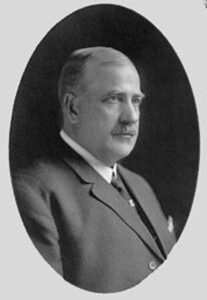Rodmond Palen Roblin (1853–1937)

R.P. Roblin was born in Sophiasburg, Ontario on 15 February 1853 and educated at Albert College (Belleville, Ontario). The school received its name from Bishop Albert Carman after whom the Town of Carman was later named.
Roblin worked as a cheese buyer before moving to Winnipeg, then to Carman where he operated a general store from 1880 to 1886. An enterprising entrepreneur, Roblin and his brother-in-law bought the land on which Carman was built; the value of the property being assured when the railway was extended south from Barnsley. He opened a store on Main Street and became a grain buyer. His grain elevator, which became part of the Northern Elevator chain, was the first in the region.
In 1890, Roblin acquired NE 24-6-4w and started an extensive agricultural venture. His farm home, “Maplewood”, became an agricultural showplace and the Roblin summer residence. It also established Roblin’s understanding and concern for farmers. This was enhanced by his work on draining the Boyne Marsh and promoting infrastructure development, including road and railway development. The site is now a Designated Municipal Heritage Site.
Roblin was politically active locally and on the provincial scene. He served as Reeve of the RM of North Dufferin for three years, as well as serving as warden and school trustee.
After unsuccessfully contesting Dufferin for the Liberal Party in 1886, he was elected as an Independent in 1888, then ran unsuccessfully as a Conservative for the Morden seat. In 1896 he was elected as Conservative member for Woodlands and party leader. He stepped down in 1898 in favour of Hugh John Macdonald; when Macdonald decided to run federally, Roblin again became party leader.
He was premier of Manitoba from 1900 to 1915 when he resigned over a corruption scandal involving construction of the Manitoba Legislative Building. His political beliefs were often controversial. He opposed the Manitoba Schools Act which provided for a system of non-denominational schools, on the grounds that politics had no place in education. He also opposed Prohibition and votes for women. During his tenure as Premier, Roblin promoted the grain trade by negotiating reduced rail tariffs, worked to break the CPR monopoly by encouraging railway construction, and introduced the first government-owned telephone system in North America. The boundaries of Manitoba were extended and public ownership of water rights established under his premiership.
Roblin was knighted in 1912. After leaving politics, he operated an automobile dealership. In 1937, he died in Hot Springs, Arkansas. He is commemorated by Roblin Boulevard in Winnipeg, the Town of Roblin, and the Rural Municipality of Roblin. His grandson, Dufferin “Duff” Roblin, served as premier of Manitoba from 1958–1967; he carried on his grandfather’s drainage activities by building a Floodway (“Duff’s Ditch”) around Winnipeg.
See also:
Manitoba Historical Society: Memorable Manitobans
Historica Dominion Institute: Heritage Minute on Votes for Women
Historic Sites of Manitoba: Rodmond Roblin House (RM of Dufferin)
